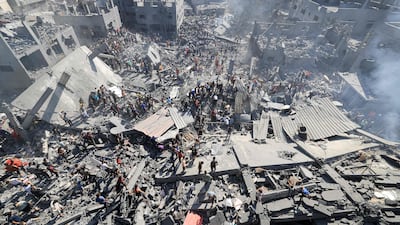Live updates: Follow the latest news on Israel-Gaza
Gaza’s economy is “ceasing activity” with the unemployment rate surging close to 100 per cent as Israel continues to bombard the besieged Palestinian enclave, according to a new report.
“With the Gazan economy ceasing activity in the fourth quarter indefinitely, combined with the destruction of the economic and residential infrastructure, any discussion of economic ‘losses’ is unrealistic, useless and unhelpful,” the Ramallah-based Palestine Economic Policy Research Institute said in a report this week.
The unemployment rate in Gaza, which before the war was the highest in the world at about 45 per cent, is currently “close to 100 per cent,” it added.
Israel continues to bombard the enclave of 2.4 million people, destroying its infrastructure and killing its residents.
More than 8,525 Palestinians have been killed, including 3,542 children, in Israeli air strikes on Gaza since October 7, according to the Health Ministry in Gaza.
“It will not be possible to restart commodity trading and services and mobilise finance at the end of this war as long as the unprecedented [and as yet unknown scale of] humanitarian needs, namely, to feed, shelter and care for more than two million displaced, wounded and traumatised persons in the Gaza Strip [are taken care of]," the report said.
“The levels of destruction and deprivation that will result from this war are simply unimaginable.”
The World Bank as well as the International Monetary Fund have voiced concern about the war and the effect it will have on Middle East economies.
The economic outlook for Gaza was grim even before the war broke out, with high unemployment and poverty levels and negligible foreign direct investment.
In Gaza, real gross domestic product per capita last year was 11.7 per cent below the 2019 level and close to its lowest level since 1994, according to recent data from the UN Conference on Trade and Development.
Israel imposed a land, sea and air blockade on the Gaza Strip in 2007 that has severely hampered the movement of people and goods and hit the enclave's economy hard.
Economic growth in Palestine slowed to 3.1 per cent in the first quarter of 2023, the result of a 2.6 per cent contraction of the economy in the Gaza Strip compared with a 4.3 per cent growth in the West Bank, according to Palestinian Central Bureau of Statistics data.
“Having contended with an almost 15-year-long economic embargo on the territory ... Gaza's economy continues to suffer from a range of structural impediments to growth, namely low productivity, goods scarcity, limited and dilapidated infrastructure and negligible foreign investment,” said Pat Thaker, editorial director for the Middle East and Africa at the Economist Intelligence Unit.
The "EIU expects these underlying issues to be severely exacerbated by the ongoing conflict. further damage to Gaza's infrastructure and economic activity will be severely disrupted, given the wide Israeli ground offensive in the short term", she said.
The Gaza Strip’s contribution to Palestine’s economy began to decline after 2006, from about 35 per cent to 25 per cent in 2013, according to the Palestine Economic Policy Research Institute.
After 2014, it reached about 19 per cent, declining further to 17 per cent in 2022.
“After 2007, Israel declared Gaza to be ‘enemy territory’. The siege and successive wars inflicted significant [direct and indirect] economic losses on the Gaza Strip, estimated by the UN to amount to about $16.5 billion," it said.
“The GDP gap between the West Bank and Gaza has steadily widened, as a result of growth in output in the West Bank combined with the sharp decline in the Gaza Strip due to the erosion of the local, industrial production base."
Gaza’s exports have also been weak in recent years due to the blockade, with export revenues in some years hardly exceeding a few hundred thousand US dollars.
"Daily loss of production in Gaza [due to the current war] specifically is estimated at $16 million, with trade plummeting to just 12 per cent of the volume recorded in October 2022, owing to the ongoing closure of key overland access points through Israel and Egypt," Ms Thaker said.
Post-war reconstruction poses a great challenge, given the extensive damage and pre-existing economic hurdles in the region, according to Vijay Valecha, chief investment officer at Century Financial.
"Rebuilding the Gaza economy will demand substantial investments in infrastructure, housing, and businesses, supported by essential international backing and financial assistance," he said.
"Recovery from the recent conflict's impact on the economy is uncertain, but it's evident that rebuilding the economy will be a prolonged and challenging process requiring significant international support."































